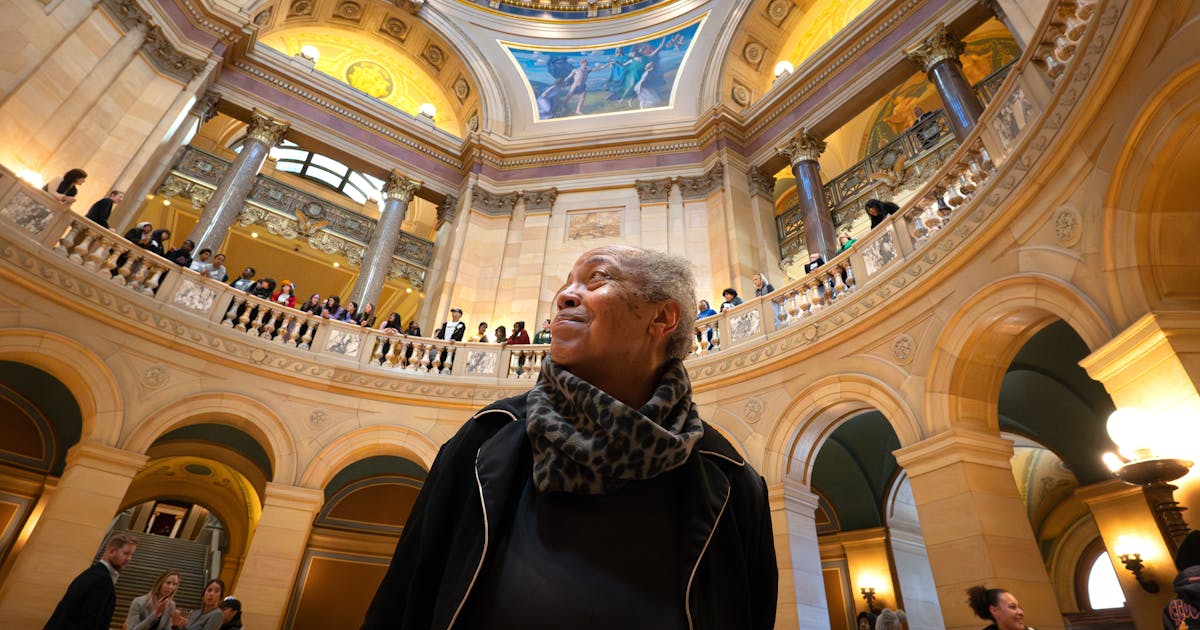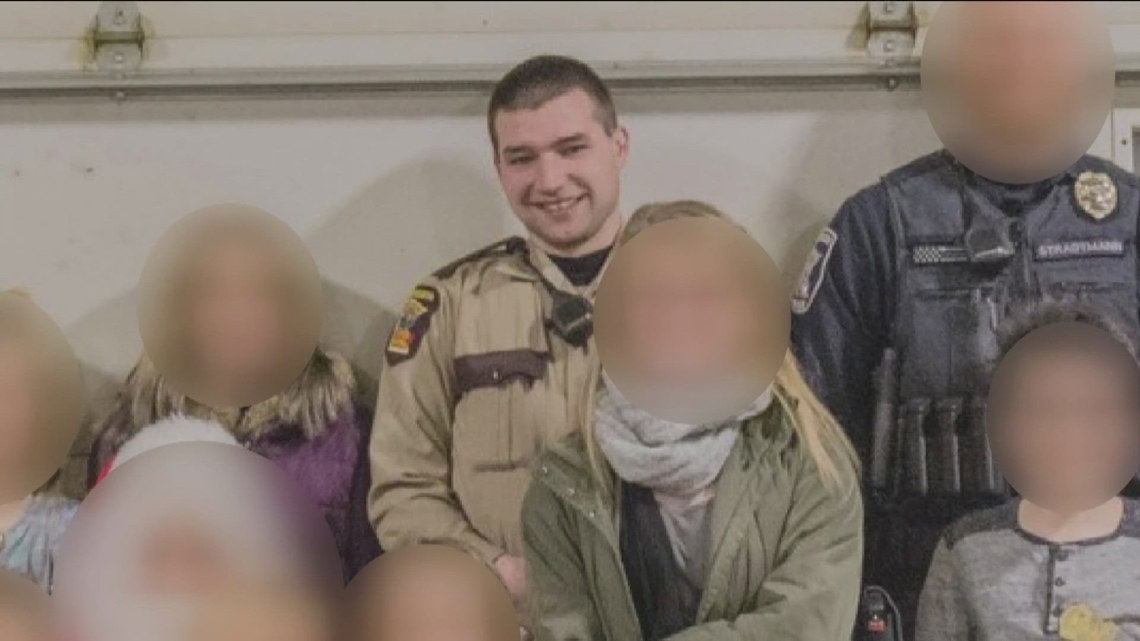Star Tribune
Once a year, the homeless speak and the politicians listen

When Sandra Johnson was a little girl, her father would ask her the same two questions at the end of every day.
Were you the best you could be?
Did you do the best you could do?
Seven decades later, his little girl walked into the Minnesota Legislature, counting each step on the grand staircase outside, making each one count. Thirty-eight. Thirty-nine. Forty. She had arrived.
“At the end of the day, I could say, ‘Yes sir, Daddy. I did the best I could do,'” she said.
It was Homeless Day at the Hill. A chance for politicians to stop talking about the housing crisis and listen. A chance for Johnson to make sure that the people who represent her actually understand her.
She always had a roof over her head. She always worked hard. She raised her four children after her husband, a veteran, died tragically young. Until she lost her job, lost her savings, lost her health and finally lost her home.
“Hi, my name is Sandra and I’m just the face of hundreds and hundreds of faces,” she said, rising to her feet in a crowded Capitol hearing room — a space large enough to hold the Minneapolis constituents who had come to see their state Sen. Scott Dibble. “We never think we might wear [the label of] ‘homeless’ and have that stigma.”
That was why she climbed all those stairs. She wanted to push back against that stigma. To share some of the stories she had heard from others less fortunate than herself. The very young, the very old, the very ill. The ones who had lost hope. The ones who headed into this snowy weekend without shelter.
One by one, others in the crowded room rose to share their stories and to lobby their lawmaker. They wanted what most of us probably want. Affordable housing. Safe, clean and peaceful mass transit. More funding to help homeless youth. Support for those struggling with mental illness and addiction. They came to beg their lawmakers to do something about the fentanyl epidemic that has killed so many Minnesotans, including Johnson’s 41-year-old son.
They talked. Their senator listened.
“As legislators, we look at legislation, we look at spreadsheets,” said Dibble, DFL-Minneapolis. “And those are very important, but they’re a little bit abstract. They become humanized and contextualized when we meet people.”
So meet Sandra Johnson, who lost her home, but never her hope, her joy or her desire to help others.
Once, she had a job and a three-bedroom home. She was two classes away from an accounting degree. Until, as she says, “life happened.” Family members fell ill. Her own cancer returned. She dipped into her retirement savings to pay for her mother’s funeral expenses. Her job was outsourced and she was downsized. She lost her home and found herself sleeping in her car.
Most people she met, she figures, had no idea. “I styled, I smiled,” she said. “I went about my day.”
Six years later, she found her way to the Catholic Charities Evergreen Residence – 88 single-room units of supportive, permanent housing, just down the street from the Minneapolis Farmers Market.
“Everyone has a story,” she said. “When you start asking, you realize ‘Wow, I’m not really going through anything. I’m not going to complain.’ “
These days, she focuses on helping the people around her. She looks after her neighbors at Evergreen, tidying up the public spaces, checking in on the new arrivals and cheering each success story when someone moves out into a place of their own.
She volunteers. She teaches computer classes for seniors at the community center. She cooks enough to share. She lobbies the Legislature.
“She has now become Mother Johnson,” said Brandon Johnson, senior property manager at Catholic Charities of the Twin Cities. He wishes the community celebrated the courage and resilience and successes of more people like her. “She’s the person who looks out for everyone here on campus.”
Sometimes, Johnson thinks about everything she’s lost. Her father, her mother, her husband, her son, her career, her home. Sometimes, she looks at the grand old mansions in town and dreams. Then she remembers who she is, what her father taught her, and what she still has.
“Now, I have an 88-bedroom residence,” she said, her smile brightening. “Yeah, kind of like a mansion.”
Star Tribune
Minnesotans reflect on Biden’s apology

Lt. Gov. Peggy Flanagan and her daughter were among the throngs Friday as President Joe Biden delivered the apology that many Indigenous Americans thought would never come.
“I think he really said the things that people have been waiting to hear for generations, acknowledged just the horror and trauma of literally having our children stolen from our communities,” said Flanagan, a member of the White Earth Band of Ojibwe. “It’s a powerful first step towards healing.”
Hundreds of boarding schools operated in the 19th and 20th centuries, separating Indigenous children from their families and forcing them to assimilate to European ways. Many children were abused, and at least 973 died, according to a report from the U.S. Department of the Interior.
Other Minnesotans reacted similarly to Flanagan, saying they welcomed the apology but that additional action is needed to help Indigenous people move forward.
Anton Treuer, a professor of Ojibwe at Bemidji State University, wrote in a newsletter that the apology was “a welcome first step on the journey to healing.”
“There is no way to truly right historical injustices for the children buried at Carlisle, Haskell, and other schools, but these words set a new tone for the country and will help heal the anguish so many Natives have carried for so long,” Treuer wrote. “It gives me hope that we can come together to reconcile and heal our troubled nation.”
Sen. Mary Kunesh, DFL-New Brighton, the first Indigenous woman to serve in the state Senate, called Biden’s apology encouraging.
“This recognition of past wrongdoings is an important step towards healing relationships between the United States and the sovereign nations affected by these past systems,” Kunesh said in a statement. “This dark period of American history must be remembered and taught.”
Star Tribune
MPD on defensive after man shot in neck allegedly by neighbor on harassment tirade

“I have done everything in my power to remedy this situation, and it continues to get more and more violent by the day,” Moturi wrote. “There have been numerous times when I’ve seen Sawchak outside and contacted law enforcement, and there was no response. I am not confident in the pursuit of Sawchak given that Sawchak attacked me, MPD officers had John detained, and despite an HRO and multiple warrants — they still let him go.”
On Friday, five City Council members sent a letter to Mayor Jacob Frey and Police Chief Brian O’Hara expressing their “utter horror at MPD’s failure to protect a Minneapolis resident from a clear, persistent and amply reported threat posed by his neighbor.”
Council Members Andrea Jenkins, Elliott Payne, Aisha Chughtai, Jason Chavez and Robin Wonsley went on to allege that police had failed to submit reports to the County Attorney’s Office despite threats being made with weapons, and at times while Sawchak screamed racial slurs. Sawchak is white and Moturi is Black.
The council members also contend in their letter that the MPD told the County Attorney’s Office that police did not intend to execute the warrant for “reasons of officer safety.”
At a Friday afternoon news conference at MPD’s Fifth Precinct, O’Hara said police had been working to arrest Sawchak since at least April, but “no Minneapolis police officers have had in-person contact with that suspect since the victim in this case has been calling us.” The chief pointed out that Sawchak is mentally ill, has guns and refuses to cooperate “in the dozens of times that police officers have responded to the residence.”
O’Hara put aside the option to carry out “a high-risk warrant based on these factors [and] the likelihood of an armed, violent confrontation where we may have to use deadly force with the suspect.” The preference, he said, was to arrest Sawchak outside his home, but “in this case, this suspect is a recluse and does not come out of the house.”
Star Tribune
Rochester lands $85 million federal grant for rapid bus system

ROCHESTER – The Federal Transit Administration has green-lighted an $85 million grant supporting the development of the city’s planned Link Bus Rapid Transit system.
The FTA formally announced the grant on Friday during a ceremonial check presentation outside of the Mayo Civic Center, one of the seven stops planned for the bus line. The federal grant will cover about 60% of the project’s estimated $143.4 million price tag, with the remaining funds coming from Destination Medical Center, the largest public-private development project in state history.
Set to go live in 2026, the 2.8-mile Link system will connect downtown Rochester, including Mayo Clinic’s campuses, with a proposed “transit village” that will include parking, hundreds of housing units and a public plaza. The bus line will be the first of its kind outside the Twin Cities — with service running every five minutes during peak hours.
“That means you may not even need to look at a schedule,” said Veronica Vanterpool, deputy administrator for the FTA. “You can just show up at your transit stop and expect the next bus to come in a short time. That is a game changer and a life-transformational experience in transit for those people who are using it and relying on it.”
The planned Second Street corridor is already one of the busiest roads in Rochester, carrying more than 21,800 vehicles a day, and city planners have talked for years about ways to reduce traffic congestion in the city’s downtown. Local officials estimate that the transit line, which will rely on a fleet of all-electric buses, will handle 11,000 riders on its first day of operation and save eight city blocks of parking.
Speaking to a crowd of about 100 people gathered on Friday, Sen. Amy Klobuchar said the project shows Rochester is thinking strategically about how it handles growth.
“If you just plan the business expansion, and you don’t have the workforce, you don’t have the child care, the housing or the transit, it’s not going to work very well as a lot of communities across the nation have found,” Klobuchar said.




